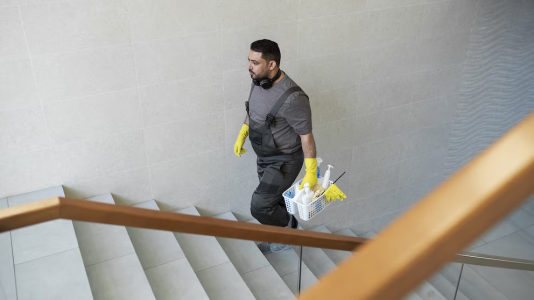BuySellBA
Administrator
Expenses have accumulated an increase of almost 150% this year: what is expected for the coming months - Infobae

Source:

Las expensas acumulan casi 150% de aumento en el año: qué se espera para los próximos meses
Un relevamiento sobre 120.000 casos en CABA y cercanías reveló que, pese a la moderación en la inflación general, continúan en alza. La creciente morosidad y el deterioro en el mantenimiento de los edificios complican la situación
November 18, 2024
A survey of 120,000 cases in CABA and surrounding areas revealed that, despite the moderation in general inflation, it continues to rise. The growing delinquency rate and the deterioration in the maintenance of buildings complicate the situation.
By Jose Luis Cieri

Facade cleaning. There are consortiums that are having a hard time because the collection of expenses has decreased and it is increasingly more expensive to carry out preventive maintenance of the facilities (Illustrative Image Infobae)
Expenses in October rose by 5.13% on average, more than inflation, and have accumulated an increase of 145.55% so far this year, according to a private survey that covered 120,000 households in the City of Buenos Aires and surrounding areas.
According to the work carried out by the platform specialized in the digital administration of consortia Octopus PropTech, the average value of expenses last month reached $163,596 per unit, a figure that reflects all the expenses associated with the consortium, such as salaries, public services, security, cleaning and maintenance.
The public services sector was one of the most affected by the increases. In October, its weight in total expenses reached 18.97% and consolidates an upward and sustained trend since May. The item includes bills for services such as Aysa, Metrogas, Edenor and Edesur. The case is different for the category that includes monthly or bi-monthly payments such as security, Internet, elevator maintenance, fire extinguishers, unclogging and fumigation.
Among the monthly increases recorded, the most recent jump was the highest, preceded by 17.74% in September and 15.38% in August.
Nicolás Baccigalupo , CEO of Octopus PropTech, told Infobae that “rates have been lagging for years, with a level of repressed inflation that we are now seeing corrected. This generates a sustained increase in the costs of public services, which already represent more than 18% of total expenses in October.

Building manager works hard on cleaning and maintaining the facilities - (Illustrative Image Infobae)
“The sharp increase in tariffs in 2024 seeks to adjust the costs of companies and generates pressure on consortia that also face increases in the salaries of managers,” he added.
Rising delinquency
The economic context also impacted the collectibility of expenses. During 2024, the downward trend in payment levels deepened. While in 2022 collectibility remained stable above 90%, last year it closed at 89.5%, and this year it reached a low of 83.67% in May.“In October, the collection rate stood at 85.18%, a slight improvement compared to the first half, but still below the previous average.
Baccigalupo warned: “The downward trend in collection is a wake-up call for the entire sector. It is essential that both administrators and co-owners collaborate to maintain a more stable flow of income, since this has a direct impact on the operations and financial health of the consortia.”
Buildings were not immune to the accumulated inflation, which in October registered a rise of 2.7% with an accumulated variation of 107% in the year.
On a year-on-year basis, the increase was 193%, with the Housing, water, electricity and other fuels category showing the highest increase in October (5.4%), mainly due to increases in rent and related expenses, water supply, electricity, gas and other fuels.
The increase in costs is not limited to CABA. According to a report by ConsorcioAbierto, expenses in several provinces also experienced sharp increases between January and October 2024, reflecting the impact of inflation on the maintenance of buildings and properties.
In the province of Buenos Aires , expenses increased by 150.08% so far this year and reached an average of $94,601 in October —7.64% more than the previous month.

As delinquency increases, the financial management of consortia and their ability to cover maintenance and service costs are affected.
The situation is similar in Córdoba , where expenses registered a rise of 160.60% in the same period. In October, the average expenditure was $89,328, which represented an increase of 5.96% compared to September. Inflationary pressure in this province is also linked to the increase in the cost of services and general inflation that impacts contracts and supplies for buildings.
Late payment of expenses has become one of the main challenges for consortia in CABA. Currently, 17% of the functional units in buildings in the city have accumulated debts.
Neighborhoods such as Recoleta have a debt level of 23% of total expenses, while in Almagro the figure rises to 32%. This trend has remained constant over the last few months, which is causing concern among administrators and owners.
Albano Laiuppa , director of ConsorcioAbierto, stressed that one of the keys to reducing late payments is to improve communication between administrators and residents. “It is essential that residents willing to pay feel supported by administrations that use technology to send notifications and reminders of due dates, as well as to discuss possible payment plans.”
Expectations for the coming months
The challenge of managing condominium costs is critical in the current economic climate. Although inflation is projected to slow, adjustments in utility rates could continue to put pressure on expenses, further complicating the situation for tenants and owners who are already struggling to meet these payments.
Expenses have accumulated a strong increase in the year, a situation that requires administrators to do the math correctly in order to maintain a healthy financial equation for the consortium (Illustrative Image Infobae)
The central question remains when we might expect an easing of the expense increases.
David Loisi , president of the Horizontal Property Consortium League Foundation, said that although a slight slowdown was recently observed, the outlook is still conditioned by factors such as salary negotiations and the need for repairs. “It is expected that the rate of increases will decrease, but this depends on how the collective bargaining and the maintenance needs of each building evolve.”
The salary increases for caretakers usually exceed inflation, which creates an imbalance for the consortia that also experience adverse factors in carrying out preventive maintenance in common areas and facades. Loisi highlighted that these retroactive increases have a special impact on retired and self-employed owners.
In this sense, it is expected that in the immediate future the increases will be more moderate, although the inertia of the previous negotiations could still have an impact in the coming months.
Difficult December
Another significant pressure on expenses is the payment of Christmas bonuses and year-end bonuses. According to Loisi, although some administrations have planned a fund for these expenses, December will continue to be a difficult month.Loisi warned that the non-payment by some owners ends up affecting those who meet their obligations, since the costs are distributed among everyone. “The more debtors there are, the higher the expenses,” he stressed. In addition, the indirect impact of increases in services such as electricity and gas contributes to some owners prioritizing other debts, further increasing the levels of defaulters.
Consortia where owners are more involved in finding budgets and optimising suppliers manage to maintain a certain control over costs. Loisi concluded: “It is essential that administrations and residents work together to mitigate these increases, avoiding overpricing and optimising available resources.”
www.buysellba.com

